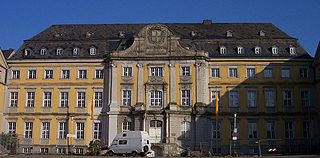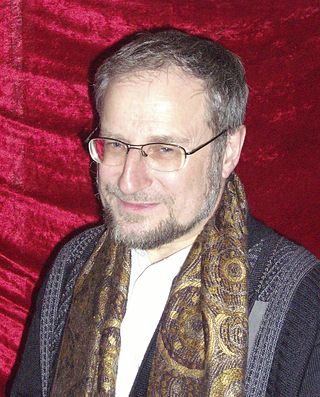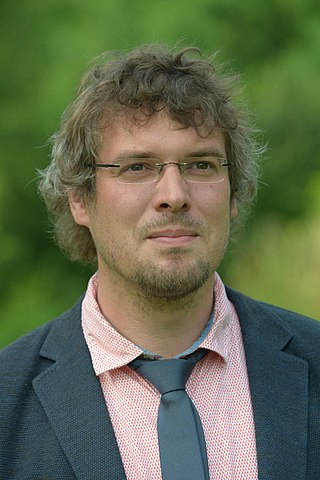Dr. Karl-Ludwig Gotthard Elvers (born 2 November 1962 in Berlin) is a German historian.
After school and high school in Berlin, Elvers studied Latin and history at the Free University Berlin. In 1988 he passed his state examination, and in 1992 became Research Assistant at the Commission for Ancient History. Then he moved to the Ruhr University Bochum, where he has taught since 1994 as a teacher in higher education employment. In 1993 his doctorate at the University of Berlin was a thesis on history in Cicero's speeches and aspects of the late Republican understanding of history.
His main research interest is in the intellectual history of the late Roman Republic. He teaches all aspects of ancient history, but focuses on the political history of the Roman Empire. His duties at the university include caretaking of the Institute's coin collection.
Elvers is the department editor of the German encyclopedia of classical scholarship Der neue Pauly for the prosopography of the Roman Republic, and wrote numerous articles for the work.

The Ruhr, also referred to as the Ruhr area, sometimes Ruhr district, Ruhr region, or Ruhr valley, is a polycentric urban area in North Rhine-Westphalia, Germany. With a population density of 2,800/km2 and a population of over 5 million (2017), it is the largest urban area in Germany. It consists of several large cities bordered by the rivers Ruhr to the south, Rhine to the west, and Lippe to the north. In the southwest it borders the Bergisches Land. It is considered part of the larger Rhine-Ruhr metropolitan region of more than 10 million people, which is the third largest in Europe, behind only London and Paris.

Bochum is a city in North Rhine-Westphalia. With a population of 364,920 (2016), is the sixth largest city of the most populous German federal state of North Rhine-Westphalia and the 16th largest city of Germany. On the Ruhr Heights (Ruhrhöhen) hill chain, between the rivers Ruhr to the south and Emscher to the north, it is the second largest city of Westphalia after Dortmund, and the fourth largest city of the Ruhr after Dortmund, Essen and Duisburg. It lies at the centre of the Ruhr, Germany's largest urban area, in the Rhine-Ruhr Metropolitan Region, and belongs to the region of Arnsberg. Bochum is the sixth largest and one of the southernmost cities in the Low German dialect area. There are nine institutions of higher education in the city, most notably the Ruhr University Bochum, one of the ten largest universities in Germany, and the Bochum University of Applied Sciences.

The Ruhr University Bochum is a public research university located in the southern hills of the central Ruhr area, Bochum, Germany. It was founded in 1962 as the first new public university in Germany after World War II. Instruction began in 1965.

The University of Duisburg-Essen is a public research university in North Rhine-Westphalia, Germany. In the 2019 Times Higher Education World University Rankings, the university was awarded 194th place in the world. It was originally founded in 1654 and re-established on 1 January 2003, as a merger of the Gerhard Mercator University of Duisburg and the university of Essen. It is based in both the cities of Duisburg and Essen, and a part of University Alliance Metropolis Ruhr.
The Gottfried Wilhelm Leibniz Prize, in short Leibniz Prize, is awarded by the German Research Foundation to "exceptional scientists and academics for their outstanding achievements in the field of research". Since 1986, up to ten prizes are awarded annually to individuals or research groups working at a research institution in Germany or at a German research institution abroad. It is considered the most important research award in Germany.
Michael Hagemeister is a German historian and Slavist, an authority on The Protocols of the Elders of Zion and on Sergei Nilus.

The Folkwang University of the Arts is a university for music, theater, dance, design, and academic studies, located in four German cities of North Rhine-Westphalia. Since 1927, its traditional main location has been in the former Werden Abbey in Essen in the Ruhr area, with additional facilities in Duisburg, Bochum, and Dortmund, and, since 2010, at the Zeche Zollverein, a World Heritage Site also in Essen. The Folkwang University is home to the international dance company Folkwang Tanz Studio (FTS). Founded as Folkwangschule, its name was Folkwang Hochschule from 1963 until 2009.

The Bundesstraße 1 is a German federal highway running in an east-west direction from the Dutch border near Aachen to the Polish border at Küstrin-Kietz on the Oder River.

Géza Alföldy was a Hungarian historian of ancient history.
Werner Abelshauser is a German economic historian.
K. Ludwig Pfeiffer is a German scholar in literary, media and cultural studies, born on February 23, 1944 in Neustadt an der Aisch, Middle Franconia, Germany. Besides his own publications, he is the editor and co-editor of 14 volumes in various research disciplines.
Karl-Wilhelm Welwei was a German historian. He was regarded as one of the most notable experts on the history of Ancient Greece.
The actual boundaries of the Ruhr vary slightly depending on the source, but a good working definition is to define the Lippe and Ruhr as its northern and southern boundaries respectively, the Rhine as its western boundary, and the town of Hamm as the eastern limit.
Karl Galinsky is an American academic best known for his research on Ancient Rome.

Hans-Wolfgang Arndt is a German lawyer, professor for tax law and former president (rector) of the University of Mannheim from 2001 to 2012. Previously he was professor for tax law at the Department für Rechtswissenschaften at the University of Konstanz.
Heiko Steuer is a German archaeologist, notable for his research into social and economic history in early Europe. He serves as co-editor of Germanische Altertumskunde Online.

Christoph Auffarth is a German religious scholar and theologian. Auffarth is a professor at the Institute of Religious Studies / Education at the University of Bremen with a focus on history and theologies of Christianity.

Benedikt Paul Göcke is a German philosopher and theologian. He is University Professor for the Philosophy of Religion and Philosophy of Science at the Catholic Theological Faculty of the Ruhr University Bochum and an associate member of the Faculty of Theology and Religion at the University of Oxford. His research includes theoretical, practical and historical philosophy and can be divided into three main areas: philosophy of science and metaphysics, transhumanism and ethics of digitization, and German Idealism, in particular the philosophy of Karl Christian Friedrich Krause (1781–1832).
Rudolf Vierhaus was a German historian who mainly researched the Early modern period. He had been a professor at the newly founded Ruhr University Bochum since 1964. From 1971, he was director of the Max-Planck-Institut für Geschichte in Göttingen. He became known for his research on the Age of Enlightenment.